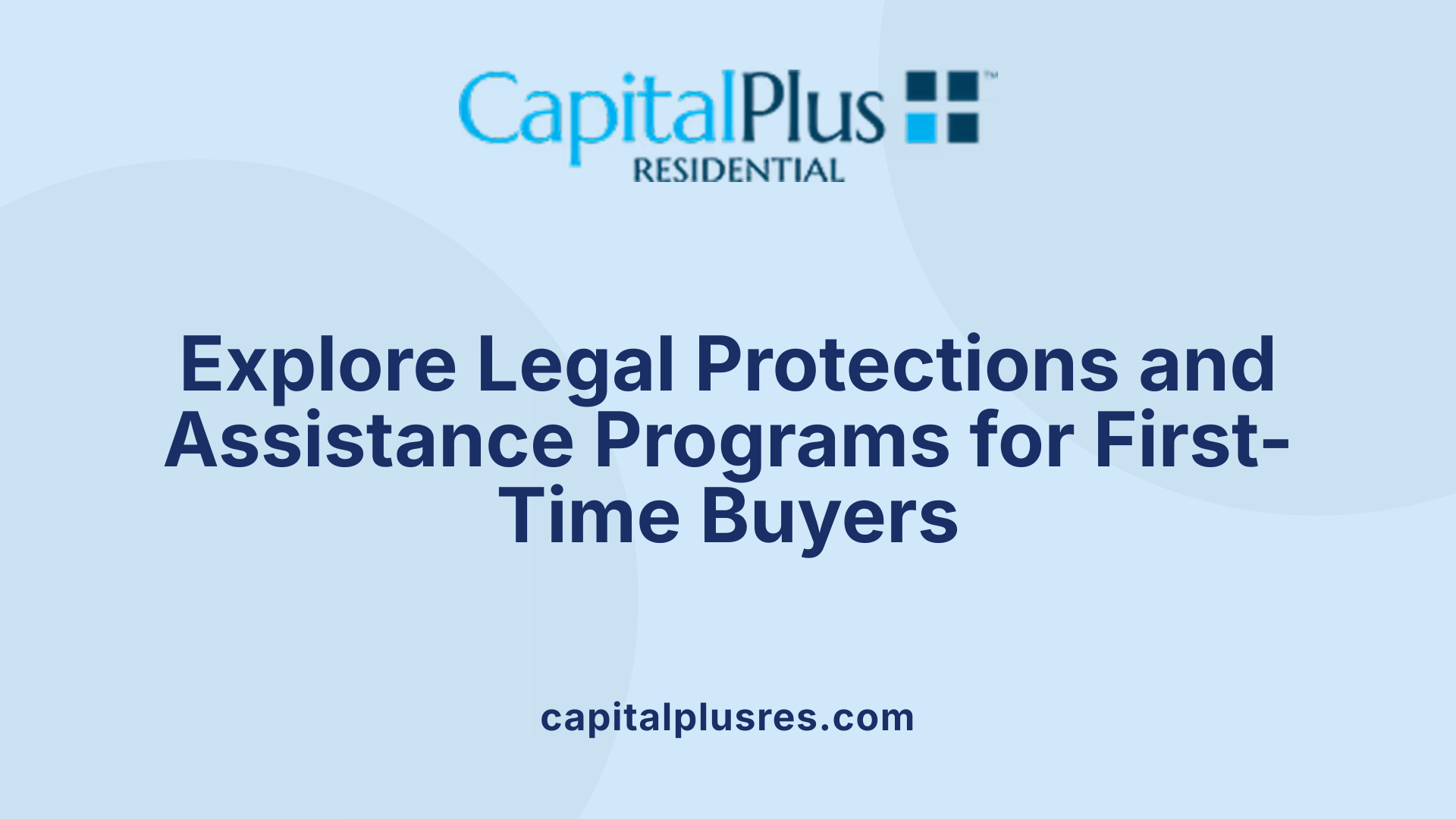Embarking on Your Homeownership Journey
Buying your first home is an exciting milestone that requires careful planning and informed decision-making. From assessing your financial readiness to understanding mortgage options and legal rights, this guide will walk you through the essential steps and considerations that can help you navigate the complex process of mortgage planning tailored for first-time buyers.
Assessing Financial Readiness and Setting a Budget
How can I use mortgage calculators to determine my borrowing capacity?
Utilizing a mortgage calculator helps you estimate the amount you can borrow based on your income, existing debts, and expenses. These tools, such as the one offered by Alliant Credit Union, consider important factors like property taxes, insurance costs, down payments, and loan terms. By inputting your financial details, you get a realistic picture of your potential monthly payments and overall borrowing limit.
Why is it important to keep housing costs below 31–40% of my gross monthly income?
Maintaining housing costs within this range ensures you don’t overextend financially. Ideally, your total housing expenses—covering principal, interest, property taxes, and insurance—should not exceed 30% of your gross income. This guideline helps you manage your finances better, allowing room for other essential expenses and savings. Lenders often prefer this ratio, making it easier to qualify for a mortgage.
How can I check and improve my credit score before house hunting?
Start by reviewing your credit report for errors or discrepancies. Pay all bills on time, reduce credit card balances to below 30% of your credit limit, and avoid opening new credit accounts close to your home buying timeline. Improving your credit score can qualify you for lower interest rates and better mortgage terms. Many sources, including HUD-approved agencies, recommend these steps for a higher credit rating.
What should I plan for in terms of upfront costs?
Upfront costs include a down payment, closing costs, and moving expenses. Aiming for at least 20% down can help avoid private mortgage insurance (PMI) and secure more favorable interest rates. Closing costs can range from 1.5% to 5% of the purchase price and include fees for inspections, legal services, and appraisals. Starting to save early for these expenses, along with regular savings for future repairs and furnishings, positions you for a smoother buying process.
How do these financial steps fit into the overall home buying process?
Assessing your financial readiness through tools like mortgage calculators and credit checkups forms the foundation of a successful home purchase. It helps determine what price range you should target, guides you in saving the necessary funds, and prepares you for negotiations and mortgage approval. Proper planning ensures that when you find your ideal home, your finances are well-aligned, decreasing stress and increasing confidence in your decision.
| Step in Home Buying | Action | Financial Focus | Details |
|---|---|---|---|
| Use mortgage calculator | Estimate borrowing capacity | Income, debts, expenses | Helps set realistic price range |
| Budget for housing costs | Keep costs within 30-36% | Income, ongoing obligations | Prevents overextension |
| Check and improve credit score | Ensure favorable mortgage terms | Credit report review, timely bills | Improve loan eligibility |
| Save for upfront costs | Prepare for down payment, closing | Savings, planned expenses | Reduces last-minute financial stress |
| Plan for future costs | Allocate funds for repairs & maintenance | Savings, future planning | Maintains home value |
Understanding each aspect of your financial health and planning accordingly positions you for being a confident, prepared homebuyer, ready to move forward with clarity and security.
Understanding Mortgage Options and Eligibility

What mortgage options are available for first-time homebuyers?
First-time homebuyers have a variety of mortgage choices suited to different financial situations and preferences. Conventional loans are common, offering fixed or adjustable rates with down payments as low as 3%. These are often backed by Fannie Mae or Freddie Mac and may require private mortgage insurance (PMI) if the down payment is under 20%.
Government-backed loans such as FHA, VA, and USDA loans also serve first-time buyers well. FHA loans are popular because they require lower credit scores and down payments—sometimes as low as 3.5%. VA loans are available for qualified veterans and active-duty military personnel, offering benefits like no down payment and no PMI. USDA loans are designed for rural homebuyers and often do not require a down payment, with comparatively lenient credit requirements.
Alongside these, there are specialized low-down-payment programs like Conventional 97, HomeReady, and Home Possible. These are typically backed by Fannie Mae or Freddie Mac and allow down payments as low as 3%, making homeownership more accessible.
Many assistance programs exist to help with down payments and closing costs. These include grants, low-interest loans, and tax credits, often provided by state agencies, non-profit organizations, or through employer-sponsored schemes. These programs aim to make homeownership achievable for first-time buyers who may have limited savings.
It is crucial for first-time buyers to compare lender options carefully. This includes reviewing interest rates, loan terms, down payment requirements, and available incentives. Seeking prequalification from multiple lenders provides an estimate of borrowing capacity and helps in making informed decisions.
How can I leverage assistance programs and compare lenders?
Research various assistance options early in your home buying journey. Many programs target first-time buyers specifically and can significantly reduce upfront costs. Check eligibility criteria, application processes, and benefits such as grants, low-interest loans, or tax credits.
When comparing lenders, consider not only interest rates but also overall loan costs, flexibility of repayment terms, customer service, and additional benefits like assistance with closing costs. Prequalification enables you to understand your borrowing potential without a hard credit inquiry, providing a realistic picture of what you can afford.
Engaging with reputable mortgage brokers or financial advisors can help you navigate options effectively. They can connect you with lenders offering the most advantageous terms based on your financial profile.
To summarize, numerous mortgage products and assistance options exist for first-time homebuyers. Their selection depends on your financial readiness, credit standing, and homeownership goals. Comparing lenders and understanding specific program benefits can make the home buying process smoother and more affordable.
| Mortgage Type | Typical Down Payment | Eligibility Highlights | Additional Benefits |
|---|---|---|---|
| Conventional (Fannie Mae/Freddie Mac) | As low as 3% | Good credit, stable income | PMI can be removed after reaching 20% equity |
| FHA | 3.5% | Lower credit scores, moderate income | Easier qualification, worse rates if overused |
| VA | None | Military active or retired | No down payment, no PMI, competitive rates |
| USDA | None or low | Rural or suburban areas | No down payment, seller subsidy allowed |
This overview consolidates the main options and considerations, making it easier for first-time buyers to identify suitable mortgage pathways.
Preparing for the Buying Process and Working with Professionals

How to choose a real estate agent with referrals?
Finding the right real estate agent is a crucial step in the home buying process. Start by asking friends, family, or colleagues for recommendations. You can also look for agents with good online reviews or those who are well-established in your target area.
Ask potential agents for references and verify their experience with first-time buyers. A good agent should understand your needs, be responsive, and be transparent about their fees and services.
What is the difference between getting prequalified and preapproved?
Prequalification is an initial step where lenders estimate how much you can borrow based on your self-reported income, debts, and assets. It involves a simple review, often online or over the phone, and does not impact your credit score.
Preapproval, on the other hand, involves submitting detailed financial documents like bank statements, pay stubs, and tax returns. Lenders conduct a thorough review, check your credit, and give you a formal letter stating the amount you are eligible to borrow. Preapproval is more reliable and shows sellers you are a serious buyer.
Why understand the role of mortgage brokers?
Mortgage brokers act as intermediaries between you and multiple lenders. They help you compare various loan options, interest rates, and terms, ensuring you find the best deal available.
Brokers also assist in gathering necessary documentation and managing the application process. Using a broker can save you time and help you navigate complex mortgage options, especially if you are new to home buying.
How to search for homes within your budget and needs?
Start by calculating your affordability using tools like mortgage calculators, which consider your income, debts, and expenses. Aim to keep your housing costs below 31–40% of your gross monthly income.
Determine your must-haves versus nice-to-haves in a property, such as location, size, and features. Use online listings, work with your real estate agent, and attend open houses to find homes that match your criteria.
Be realistic about your budget to avoid overextending financially. Remember that additional costs like property taxes, insurance, HOA fees, and closing costs should also fit within your affordable range.
What are the basic steps involved in purchasing a home for the first time?
The process generally begins with assessing your financial situation, including reviewing your credit report and improving your credit score by paying bills on time and correcting errors.
Next, determine your borrowing capacity using a mortgage calculator and get prequalified or preapproved. This helps set a realistic price range for your home search.
Choose a real estate agent and begin searching for homes within your budget. When you find a suitable property, make an offer based on market conditions and your research.
After your offer is accepted, submit necessary documents for mortgage approval, including sale agreements and bank statements.
Schedule a home inspection to assess property condition, and conduct an appraisal for your lender.
Secure homeowners insurance and negotiate repairs or price reductions if needed. Finalize your mortgage paperwork, pay closing costs, and complete the legal transfer of ownership during closing.
Throughout this process, familiarize yourself with first-time homebuyer programs, understand your rights, and plan for moving expenses.
Navigating the Home Inspection, Appraisal, and Negotiations

What are the basic steps involved in purchasing a home for the first time?
Buying a home for the first time can seem complex, but breaking it down into stages simplifies the process. It starts with assessing your financial situation, understanding your monthly income, savings, and debts. This helps you determine what you can afford.
Once you have a clear budget, the next step is to get pre-approved for a mortgage. This offers a reliable estimate of your borrowing capacity and shows sellers that you are serious. Early in the process, you should also research and select a reputable real estate agent, as they can guide you through the various steps.
After setup, begin actively searching for homes that meet your needs and preferences. When you find a suitable property, you'll make an offer. This offer should consider current market conditions and include contingencies like inspections and financing.
Once your offer is accepted, it's time to complete formal steps such as submitting necessary documents including bank statements, pay stubs, and tax forms. Concurrently, arrange for a home inspection and a property appraisal.
The home inspection is crucial to assess the property’s condition. It looks for issues like structural problems, electrical or plumbing issues, mold, and other potential hazards.
Understanding the difference between an inspection and an appraisal is important. An inspection evaluates the property’s physical condition, while an appraisal determines its market value for lending purposes.
Following inspections, you may need to negotiate with the seller. Common topics include repairs, making price reductions if issues are found, or adjusting closing costs. Negotiating effectively can save you money and ensure the home is a sound investment.
Securing homeowners insurance is also vital. You’ll buy a policy to protect your property and belongings. Consider additional coverage options for floods, earthquakes, or other risks, especially depending on your location.
The final steps include a property appraisal to satisfy lender requirements and an orderly closing process. During closing, you'll review and sign all legal documents, pay closing costs, and officially transfer ownership.
Throughout this journey, understanding your rights, exploring first-time buyer programs, and working with reliable professionals can make the process smoother and more manageable.
Important considerations for first-time buyers
| Step | What to Do | Details and Tips |
|---|---|---|
| Financial Prep | Review credit, save for costs | Improve credit scores, save at least 20% for a down payment |
| Mortgage Pre-Approval | Get pre-approved to know borrowing limit | Use online tools and consult multiple lenders |
| House Hunting | Search within your affordability range | Focus on the total monthly housing cost (25-30%) of income |
| Making an Offer | Negotiate terms and contingencies | Include inspections, repairs, and closing costs in offer |
| Inspection & Appraisal | Schedule to avoid delays | Inspection assesses property condition; appraisal confirms value |
| Closing & Moving | Prepare for legal and financial transfer | Review all documents, plan your move |
Additional insights on homebuying financials
Understanding mortgage options such as FHA, VA, or conventional loans can provide flexibility. Many programs support first-time buyers with low down payments or no PMI. Savings strategies, including early planning for upfront costs like closing and moving expenses, are essential. Maintaining a good credit score enhances your chances of securing favorable mortgage terms.
By following these steps and utilizing available resources, first-time buyers can navigate the homeownership journey with confidence. Proper preparation, informed negotiations, and diligent inspections lay the foundation for a successful purchase.
Managing Financial Aspects and Mortgage Closing

What should I consider when planning my budget for buying a home?
When developing a homebuying budget, start by evaluating your current income and expenses. Use a mortgage calculator, like the one offered by Alliant Credit Union, to estimate how much you can borrow based on your gross income and existing financial obligations. Generally, housing costs should be kept below 31–40% of your gross monthly income to maintain financial health.
It's important to account for ongoing costs such as property taxes, homeowner’s insurance, maintenance, and utilities. These costs can significantly influence your monthly payments and overall affordability. Experts recommend that your total housing expenses, including principal, interest, taxes, and insurance (PITI), should not exceed 25–30% of your gross monthly income.
Additionally, consider upfront expenses when planning your budget. These include a down payment—preferably around 20% to avoid private mortgage insurance (PMI) and secure better mortgage rates—and closing costs, which typically range from 1.5% to 5% of the home purchase price. Other initial costs include moving fees, home inspections, and furnishing your new space.
A thorough review of your debts and credit score is crucial. Improving your credit by paying bills on time, reducing credit card balances, and correcting any errors can improve your loan options and interest rates. If you're a first-time buyer, research assistance programs like FHA loans, which often require lower down payments and have less strict credit requirements.
By gathering all relevant financial documents—such as tax returns, bank statements, pay stubs, and insurance policies—you can streamline the pre-approval process with lenders. Getting pre-approved not only demonstrates seriousness but also helps you know your borrowing limits. Early preparation and disciplined savings will ensure you have enough funds for the initial costs and any surprises during the buying process.
In summary, careful planning involves honest assessment of your finances, understanding all associated costs, and using tools and resources to ensure your home purchase remains within your financial reach. Starting this process early, with detailed budgeting and financial review, can make your homeownership journey smoother and more successful.
How do I calculate mortgage payments to ensure affordability?
Calculating your mortgage payments involves understanding the loan amount, interest rate, loan term, and additional costs like property taxes and insurance. Using mortgage calculators, like those provided by financial institutions such as Wells Fargo and Alliant Credit Union, can help simulate different scenarios.
Generally, your total monthly housing costs should not exceed 28-30% of your gross monthly income. This includes principal, interest, property taxes, homeowners insurance, and possibly HOA fees. For example, if your gross monthly income is $5,000, aim for a total housing cost of about $1,400–$1,500.
Lenders often look for your debt-to-income ratio (DTI), which should ideally be below 36–43%. To determine this, add your total monthly debts—such as student loans, car payments, and credit card obligations—and compare this sum to your gross monthly income.
Using an affordability calculator, input your income, debts, estimated property taxes, insurance premiums, and down payment to estimate your maximum loan amount and monthly payment. This tool helps ensure you choose a home within your financial comfort zone.
What should I know about closing costs and how to prepare for them?
Closing costs are fees incurred at the final stage of buying a home, typically ranging from 1.5% to 5% of the purchase price. These costs include loan origination fees, appraisal fees, title insurance, escrow fees, and others.
To prepare, request a Loan Estimate from your lender early in the process. This document provides a detailed breakdown of expected costs. Budget ahead by saving extra funds to cover these expenses, which can be paid out of pocket or rolled into your mortgage loan if permissible.
Understanding the costs helps prevent surprises at closing, where you'll review and sign numerous legal documents. Be ready to pay closing costs via a cashier’s check or wire transfer.
How do I gather necessary documentation for closing?
Preparing the right documents can streamline your closing process. Typically, you'll need:
- Proof of income, such as recent pay stubs and tax returns
- Bank statements showing available funds for down payment and closing
- Identification, like a driver's license or passport
- Sale agreement and purchase contract
- Records of any additional assets or sources of funds
- Proof of homeowner’s insurance
- Summary of debts and obligations
Having these documents organized and ready can speed up approval and ensure a smooth closing.
What happens during signing and paying closing costs?
At the closing appointment, you'll review and sign legal documents, including the mortgage agreement and property deed. Ensure all your questions are answered beforehand.
You'll pay your closing costs, either through a cashier’s check or wire transfer. Once all paperwork is signed and funds are transferred, ownership of the property is officially transferred to you.
What should I do after closing to prepare for homeownership?
Post-closing, confirm your mortgage account details and set up payment reminders. Review your homeowner’s insurance policy and ensure coverage is active.
Create a budget for ongoing maintenance, utilities, and unexpected repairs. Consider setting aside an emergency fund specific to home repairs.
Finally, familiarize yourself with your legal rights and responsibilities as a homeowner. Regularly reviewing your mortgage statements and maintaining good credit will support your financial health in the years to come.
Legal Rights and Assistance Programs for First-Time Buyers

Are there specific programs or legal rights available to first-time homebuyers?
Yes, numerous programs and legal protections are available to support first-time homebuyers. These resources are designed to make homeownership more accessible and secure.
Federal, state, and local agencies offer a variety of assistance options. Common programs include grants, low-interest loans, and down payment or closing cost assistance. For example, FHA loans allow for lower down payments, often as low as 3.5%, and are suitable for many first-time buyers. The NC 1st Home Advantage is another program tailored to help first-time buyers in North Carolina, offering support with down payments. Other initiatives target specific groups such as veterans or residents of public housing.
Legal protections under laws like the Fair Housing Act and the Real Estate Settlement Procedures Act (RESPA) play a crucial role. These laws ensure fair treatment during the homebuying process, prohibit discrimination, and mandate transparent disclosure of costs and terms. The Fair Housing Act, for instance, prevents discrimination based on race, color, national origin, religion, sex, familial status, or disability.
Eligibility for these programs often depends on criteria like income limits, credit scores, and the purchase of targeted areas. Many programs define a first-time homebuyer as someone who hasn't owned a primary residence within the past three years, allowing some flexibility for previous homeowners.
To maximize benefits, prospective buyers are encouraged to work with approved lenders or housing agencies. These entities can guide applicants through eligibility requirements, help prepare necessary documents, and connect them with suitable programs.
Researching these rights and resources is vital. Start by consulting official websites, such as HUD or state housing agencies, and seeking assistance from HUD-approved housing counseling agencies, which are reliable sources of guidance.
Understanding and leveraging legal rights and assistance programs can significantly reduce barriers and costs, paving the way for a successful first home purchase.
| Program Type | Typical Assistance | Eligibility Highlights | Additional Notes |
|---|---|---|---|
| Grants | Down payment, closing costs help | Income limits, first-time buyer status | Usually requires application and qualification process |
| Low-interest loans | Reduced interest rates, longer terms | Varies by program | Often paired with down payment assistance |
| Down payment help | Direct financial support | First-time or targeted area buyers | May have conditions such as property location or income level |
| Special loans (e.g., VA, USDA) | No or low down payment | Service members, rural area residents | Often have specific eligibility criteria |
This array of resources underscores the importance of research, planning, and working with authorized agencies to make the homebuying process smoother and more affordable.
Ready for Homeownership: Your Next Steps
Successfully planning for your first home purchase involves understanding your financial situation, exploring suitable mortgage options, engaging with real estate professionals, and being aware of available assistance programs and legal rights. Using tools like mortgage calculators and getting prequalified can help you set realistic expectations. Remember to stay within your budget, conduct thorough inspections and negotiations, and prepare for the financial responsibilities that come with ownership. With careful planning and informed decisions, you can confidently embark on your journey to becoming a homeowner.
References
- 7 Tips for First-Time Homebuyers - DFPI - CA.gov
- Tips for First-Time Home Buyers
- Buying a Home | HUD.gov / U.S. Department of Housing ...
- First-Time Homebuyer Guide: Mortgage Options & Budgeting
- First-Time Home Buyer Loans and Programs
- Buying a Home | HUD.gov / U.S. Department of Housing ...
- Who Qualifies as a First-Time Home Buyer? | Programs 2025









